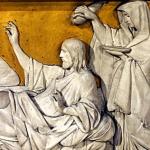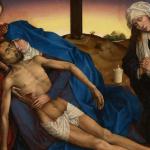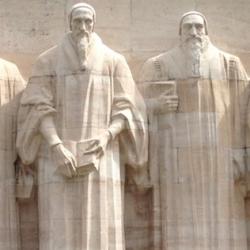Evangelicals need to thicken our theology of the Lord’s Supper, first by drawing more of the Bible into the discussion of the Supper, and second by drawing more of the Supper into discussion of the Supper.
Even a fine recent treatment of Reformed sacramental theology, Todd Billings’s Remembrance, Communion, and Hope, is still too thin on both counts. Billings does discuss the key New Testament passages—the institution narratives, Jesus’ resurrection meals, 1 Corinthians 10-11—and makes passing references to Passover and other Old Testament passages, meals, and festivals. But the richness of Old Testament theology still feels lacking. Billings observes that Paul sees manna as a type of the church’s covenant meal, but he doesn’t follow up the clue. If manna is a type, might there be others?
Many examine the Supper through a “zoom lens,” focusing narrowly on the most disputed point in historic debates – the metaphysics of the bread and wine. Much to his credit, Billings pulls back the camera to give us a wider view. In several “congregational snapshots,” he reminds us that the Supper involves people gathered to say and do, eat and drink. He rightly shows that a theology of the Supper must be integrated with the theology of the church.
But we need an even wider angle. Communion bread doesn’t fall from heaven. Wine doesn’t come tricklin’ down the rock. As one Eucharistic prayer puts it, the bread and wine are “fruit of the earth and the work of human hands.” Bread and wine represent nature transformed into culture by human action. A thick theology of the Supper needs to broaden beyond the theology of the church into a theology of culture. So, I offer a suggestive not definitive picture of what a thicker theology of the Supper might look like—a pencil drawing, not a portrait.
Supper, Communion, Eucharist Mass
First, a word about terminology. Different Christian traditions assign different names to the Lord’s Supper—Supper, Communion, Eucharist, Mass. Each spotlights a facet of this liturgical event. Calling it a “Supper” reminds us that we eat and drink; it’s “Communion” because our eating and drinking deepens our fellowship with the Lord Jesus in the Spirit; it’s “Eucharist” (from Greek eucharisto, “give thanks”) because we thank our Father for the gift of his Son, and eat and drink in gratitude.
Because of its association with Catholic errors, many Protestants resist describing the meal as a “Mass.” But the word captures an important dimension of the meal. Mass is, apparently, a contraction of the dismissal of the Latin Mass, which ends with ite, missa est – “Go, you are sent.” Calling the Supper a “Mass” reminds us of the rhythm of the church’s life: We gather so that we can be dispersed; we eat and drink so that we may be satisfied and sent. To put it in contemporary idiom, “Mass” highlights the missional force of the Supper.
Read the rest at ChristianityToday.com.












